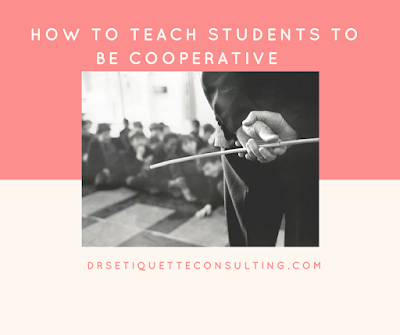Could caning
or striking deter students from being uncooperative? In my years of teaching
and in a lot of cases, caning stimulates a beastly disrespect for the authority
in question, especially in secondary schools.
Applying caning to punish
offending students can detract from our competence as teachers.
So
what then can we do if we don’t want to cane or punish students who are
uncooperative?
When
students are uncooperative when we want them to, with all punishment importance
this is not the time to cane or punish cruelly. We can’t do anything about the
fact that some students will sometimes joke with the classroom positive culture,
and all we can do is try to keep this type of act from happening ever again
when they occur.
Here is a scenario:
I was going to take a phonics and
phonetics class one day in a school when I saw a student being punished and
sent out of the classroom. Contrary to what the teacher expected, from the
moment the student walked out of the classroom, reeling from three lashes to
his butt, he was insolent!
When I drew closer to him, I asked why
he was sent out of the classroom. He said the reason was because he was drumming
on the desk while teaching was going on, and that was why his teacher got real
angry at him. I decided to tell him a story of a
boy who behaved exactly like him and suddenly lost his parents.
Slowly
I told him how this boy was moved from relative to relative who did not care
for his education after his parents died. And by the time his mates graduated
secondary school and he was hawking chin-chin for an aunt, he wished he had used well the
time his parents and teacher tried investing in his education.
So
the moral of the whole story; I made this young boy realize the consequences of demeaning time. Both the precious time his teacher devoted to teaching
him and the time he’s supposed to learn something that would give him better
outcomes in life. Consequences can be a person’s biggest lesson. While your
story might not be too tragic as the aforementioned, let students know the
impact their actions would have on them. Use consequences as model to correction
instead of striking. This technique should be a custom in our classrooms and
schools when students are uncooperative.
Furthermore,
I told the student that if I were in his shoes, when the class period comes to
an end I would walk up to the teacher and I would apologize. I would say
something like, (giving the student specific language to use) “Mrs. Abba, I am
sorry I disrespected your class.” Why did I give the student word-for-word
language, because he might not have it himself?
Telling
a child to do something without teaching him how makes no sense at all. So I taught
him what to say. Now, how did I actually have him to apologize? Simple: As I’ve
said above, I made the situation a loss
one for him so that he sees that as he is hurting the teacher, he’s also
inflicting ruins on his future. If head of schools and teachers take the
opportunity to let students learn the consequences of their bad actions instead
of caning and unleashing harsh punishment, the teaching jobs become easier and
the student lives become better.
That
being said, I’m not suggesting that we should ignore punishing students
sometimes. But I am suggesting that competent teachers and head of schools don’t
have to react harshly every time a student steps out of line. When teachers bring this exercise to life in their classrooms, they do more than
alleviate classroom discipline problems and prepare their students for success
in the work environment. These effective teachers help to build a more peaceful
world.
Action
Point: Determine to ignore
trivial disturbances and develop the ability to respond to inappropriate behavior
without escalating the situation. When student are uncooperative, let them see that
as they hurt their teacher, they inflict loss on themselves.
If you need more help on constructive teaching, please drop a message for me using the contact form.
 |
| Create More Success Damilola Ogunremi |








.png)

No comments:
Post a Comment